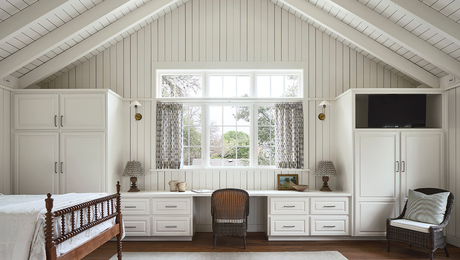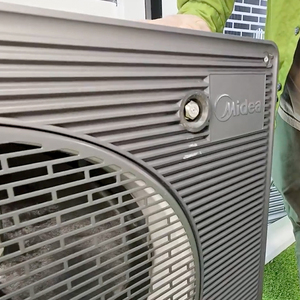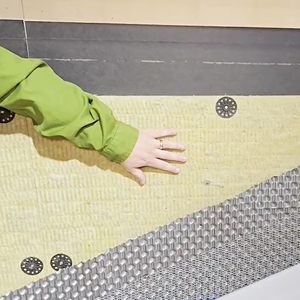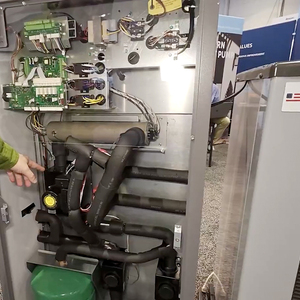Have an old home, 1860s with large brick chimneys. Any help on info re: what sealers can be painted or sprayed on to seal the brick to prevent water entry; what’s the names of the products and what prep work is involved? Many thanks.
Discussion Forum
Discussion Forum
Up Next
Video Shorts
Featured Story

This 654-sq.-ft. ADU combines vaulted ceilings, reclaimed materials, and efficient design, offering a flexible guest suite and home office above a new garage.
Featured Video
How to Install Exterior Window TrimHighlights
"I have learned so much thanks to the searchable articles on the FHB website. I can confidently say that I expect to be a life-long subscriber." - M.K.
Fine Homebuilding Magazine
- Home Group
- Antique Trader
- Arts & Crafts Homes
- Bank Note Reporter
- Cabin Life
- Cuisine at Home
- Fine Gardening
- Fine Woodworking
- Green Building Advisor
- Garden Gate
- Horticulture
- Keep Craft Alive
- Log Home Living
- Military Trader/Vehicles
- Numismatic News
- Numismaster
- Old Cars Weekly
- Old House Journal
- Period Homes
- Popular Woodworking
- Script
- ShopNotes
- Sports Collectors Digest
- Threads
- Timber Home Living
- Traditional Building
- Woodsmith
- World Coin News
- Writer's Digest


















Replies
Greetings skh,
This post, in response to your question, will bump the thread through the 'recent discussion' listing again which will increase it's viewing.
Perhaps it will catch someone's attention that can help you with advice.
Cheers
Looks like nobody is helping you with this one. If you haven't already bought something else, I would try Tamm's Chemstop. It is really good stuff. I use it on all of our brick chimneys. The water just beads up and runs off and it lasts a long time!
Two cautions:
It is very damaging to asphalt shingles. It will bubble them up almost instantly if you get any on the shingles. I always do the chimneys before the shingles are on.
Check the label for compatibility with your particular brick.
I have a big set of brick gate posts at the entrance to our drive. They are sprayed with Chemstop. When it rains, they are bone dry. It always provokes comments from people when they see that everything else is soaked and the brick posts are dry.
Thanks for the help. One more question; I've read that some true "sealers" may actually be bad for the brick - will not allow the brick to "breath" and traps moisture behind the sealer in the brick and freeze/thaw cycle damages the bricks. Any opinions? Thanks
Any brick that absorbs water and then freezes will most likely crack or chip. Of course, there is a huge difference in bricks. Some soak up water like a sponge.
We are careful to choose bricks that can weather this climate.
Why do you want to seal your bricks? Are you having problems with them freezing and then chipping off? If so, I don't see how you could do any harm by sealing them and keeping the water out before it causes a problem.
We sometimes have to use bricks that have small hairline cracks in them just from the firing process. Sealers work well to seal those cracks and prevent damage.
Chemtop is invisible on most bricks. You can't tell by looking at it that the brick is treated, but you can certainly tell when it rains.
You could research the product. As I recall, most of the warnings concern color changes in certain types of brick.
Call Tamm's tech line, maybe they could help you if you can tell them what kind of brick you have.
It's also important to use the proper joints. You don't want to use raked joints on certain types of brick exposed to the weather.
Bo
I'm looking at a brick house that was built in the 1860's. Up stairs in two closets there is black mould on the walls, my thought is that the brick is allowing water to pass through, couple that with the doors to the closet closed all the time it sort of acts as an incubator for the mould. I'm not concerned about the mould but more on how to stop it.
These houses were constructed out of soft brick, they made them locally. Just like a sponge in a bucket of water they absorb mositure real good.
I was thinking of coating the outside of the house(if I bought it) with some sort of sealer. Would this product that you mention in your post work on this, or, is the brick supposed to breath and therefore not a good idea.
Doug
I'm not sure I can give you a definite answer, but I do have a lot of experience with the type of brick you are talking about.
We also had a local brick yard that produced millions of very porous brick. When I was a kid, I made a lot of money rebuilding chimneys made with those bricks. Other kids would mow lawns for cash..I would rebuild chimneys...hundreds of them.
Most of them seemed to fail because of bad mortar. The bricks themselves did not have holes in them and would soak up water like a sponge. Actually, I saw very little damage to the bricks from freezing, so there may be something to this "breathing" theory.
I starting using sealers when we started using hard fired brick that developed tiny fissures during the process. I had trouble a few times and talked with a very knowledgeable guy at our supplier. He had been selling brick for 40 years and recommended the Tamms product. I have used it for almost 20 years and have had virtually no problems any more with brick deteriorating above the roofline.
Again, I would suggest you talk with the tech reps at some of these sealer companies to see what they say. People that deal in bricks today often have no practical experience with the old bricks.
Personally, I would be very tempted to try sealing a more inconspicuous area on that house and see what happens. I really can't see how this could hurt the brick...but I could be wrong!
The reason for possibly sealing is to minimize any water that may get into brick and go down below roofline to ceilings/chimneys below. I assume this can happen sometimes even when flashing is not the problem. Is the Tamms product the only one out there or is that what every one recommends?
I'm having the same problem with a chimney that is leaking water down the front of a fireplace during and after a long soaking rain, not a short one. The chimney has been flashed and I went over it very carefully and there ain't no way that water is getting through there. The only thing I can see is if it is seeping through the shoulders of the chimney in the mortar and the brick. I have to seal it with something and am waiting for more responses. Meanwhile I will check out local mason supply houses.
I'm sure there are many other products like that. I just found one that works and stuck with it.
I don't know what other people recommend. It is readily available through any masonry supplier.
Bricks need a drainage plane to shed any water that is absorbed. Unfortunately, that is not easy to do with something like a chimney. That's one reason I seal the brick on our chimneys.
I have used professional water seal and frogskin both are
silicone based. I used it for sealing brick masonry on an late
1700's old church it did darken the brick somewhat,but it still
is beading water 12 yrs. later
I've used professional water seal for about 15 years with excellent results. It lets the brick breath while keeping out the water. It comes in two strenghts- I've always just used the regular. The stuff does eat shingles and it also bonds permanently to glass. Same molecule as in rain-ex just a whole lot stronger mix. Jim
I don't know if this will help, but when I had a problem with water getting in through my stone chimney, a chimney guy used a siloxane based sealer and that worked (I'd had the roofer come out three times to recheck the flashing before I thought to call the chimney guy who knew right away what the problem was. It still amazes me that such a large amount of water can get in through the mortar joints.). The chimney guy charged me something like $200, which I was happy to pay as I was getting pretty frustrated. However, a little research afterwards turned up
http://www.mfgsealants.com/masonry_silox.html
as a source for this sort of sealer. I applied it with a small hand sprayer since my chimney isn't too large (maybe 6' tall over the roof, 6 foot long by 2 foot wide). It seems to work as advertised and I've had no further leaks.
Ken
Siloxane-based water repellant (not a 'sealer') seems to work well from experience.
Jeff